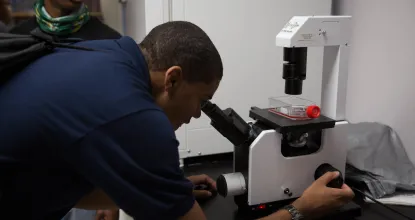
Mission Statement
The mission of the School of Clinical Sciences is to educate future clinicians. We seek to engage students in innovative, problem-based learning, preparing them to serve the regional and global community with skill and compassion. The School strives to provide excellent instruction such that graduates will be highly successful in attaining certification, employment and professional development.
Accreditation
The School of Clinical Sciences is accredited by the following agencies:
National Accrediting Agency for Clinical Laboratory Sciences
5600 N. River Road, Suite 720
Rosemont, IL 60018-5119
Phone: 773-714-8880
The Clinical Laboratory Technician and Clinical Laboratory Scientist programs are accredited by the National Accrediting Agency for Clinical Sciences (NAACLS) with Northern Michigan University as the sponsoring agency.
The Histotechnologist program is accredited by NAACLS with the clinical affiliates as the sponsoring agencies.
The Cytotechnology program is accredited by the American Society of Cytology with the clinical affiliates as the sponsoring agencies.
The Clinical Assistant program requires no accreditation but is approved by NAACLS.
Joint Review Committee on Education in Radiologic Technology
20 Wacker Drive, Suite 2850
Chicago, IL 60606-2091
Phone: 312-704-5300
The Radiography Program is accredited by the Joint Review Committee on Education in Radiologic Technology with NMU as the sponsoring agency.
Commission on Accreditation for Respiratory Care
1248 Harwood Road
Bedford, TX 76021-4244
Commission on Accreditation of Allied Health Education Programs
25400 US Highway 19 N., Suite 158
Clearwater, FL 33763
Phone: 727-210-2350
Accreditation Review Council on Education in Surgical Technology and Surgical Assisting (ARC/STSA)
6 West Dry Creek Circle, Suite 110
Littleton, CO 80120-8031
The Surgical Technology Program is accredited by CAAHEP with NMU as the sponsoring agency.
Philosophy
The faculty members of the School of Clinical Sciences believe they must provide high-quality, effective, professionally and technically oriented educational programs as described by the various professional and certification agencies. The school recognizes the ever-changing role of the clinical practitioner and believes the curriculum must include features to foster adaptability in its graduates while maintaining a current relevant curriculum. The school embraces the concept of the career-ladder education approach in curriculum design and fosters innovative ways to present education.
The school recognizes the important balance between biology, chemistry and clinical courses in the preparation of a clinical professional and, therefore, adapts an interdisciplinary approach, where applicable, in curriculum design to provide the depth and breadth needed for a specialized knowledge base.
The faculty not only serves the student, but the community and profession as a whole. Therefore, the faculty must serve as professional role models for students and provide leadership in cooperation with other organizations and agencies in promoting the profession and resolving professional issues.
The following goals are identified as necessary to fulfill the program’s philosophy; the school must:
- Provide sufficient clinical training in all areas of the profession to attain competency and proficiency as a technical support clinical professional. It is recognized that all aspects of the profession may not be performed but that the student has gained competency in techniques representative of and applicable to most procedures and/or processes.
- Provide appropriate levels of clinical training with extensive academic support.
- Include clinical and simulated experiences, and academic courses to promote adaptable multi-tasking skills among the graduates as they become exposed to varied technologies, responsibilities and future opportunities.
- Continuously evaluate and implement (as appropriate) auto-tutorial instruction which may include computer-aided instruction and audio-visual programs.
- Incorporate clinical experiences as appropriate throughout the curriculum in order to provide students with marketable skills during the process of their education.
- Closely monitor the job market and appropriately counsel students based on this information.
- Periodically undergo program review to meet accreditation or approval standards as set forth by the appropriate accreditation agencies. The program evaluation process must be frequent and in full cooperation with its academic and clinical faculty, students and administrators.
- Produce graduates who successfully complete appropriate certification exams and are highly competitive in securing future employment or advanced education as appropriate.
- Provide continuing education activities for community and regional practicing professionals.
- Hold membership and actively participate in the professional societies.
- Provide mentorship to students in the academic and clinical settings.
